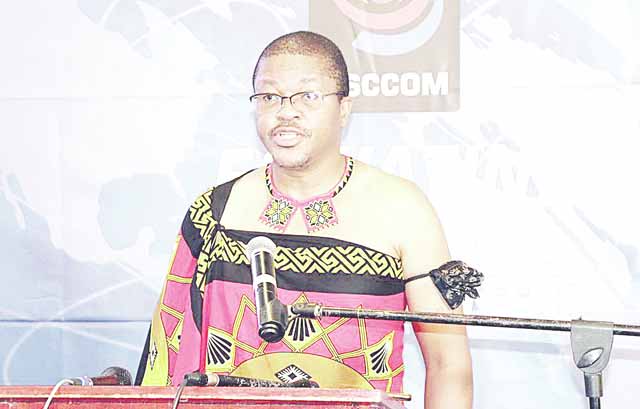By Sakhile T Shabangu - M&E Volunteer | 2020-09-03

WE are children of a patriarchal society, where femicide, gender based violence and sexual abuse often pass unnoticed.
Such happenings are painted over with stereotypes that focus on the wrong thing, always pointing fingers that severely damage the woman.
We are living in a society that constantly teaches women to survive toxic relationships instead of fixing the issue of toxic masculinity.
The year 2020 has seen tragic incidents of femicide. The killing of women persists unabated, and incredibly so, we are still overlooking the real issue.
In January, a 26-year-old woman from Mbhuleni was stabbed over 10 times by the father of her children. Just four days ago a teenage girl from Mankayane was stabbed 31 times by her boyfriend who later committed suicide.
What gives men the audacity to take women’s lives?
The World Health Organization defines “Femicide” as the murder of women solely for the reason that they are women.
Femicide encompasses all of the hegemonic masculine-social methods used to destroy females’ rights, abilities, potentials and power to live safely.
It is a form of abuse, threat, invasion and assault that degrades and makes women second class citizens.
Cameron Frazer (1987) said that Femicide is a subset of patriarchy, made drastic by the establishing of physical dominance and gender dominance fuelled by the notion that women are worthless.
Attitude
We must not dilute this problem by speaking of a single act of rage but rather recognise that male violence is part of a bigger social problem of entitlement and toxic masculinity.
Toxic masculinity doesn’t just endanger women. It harms men too, forcing them to repress their emotions and fuelling insecurities.
It is therefore our duty to call out these dangerous norms due to the damage they cause.
Swazi men who adhere to toxic traditional gender roles assume that they must exert control over women and express their dominance through violence.
Men who kill their wives or girlfriends do not just act out of rage and jealousy, their attitudes are inherited from social tradition that allows them to think they can do whatever they want to assert their manhood and honour.
As men absorb this sense of entitlement, they believe they have the legitimate authority and power to punish their wives or their alleged lovers.
When a man attacks a woman we are quick to point to ‘spontaneous rage’ but the truth is, these are calculated actions that subscribe to a socially sanctioned perception of masculinity which expects men to protect their honour by asserting their power and control.
Some people refuse to designate femicide as a real-life consequence of toxic masculinity, preferring to simply describe male murderers as insane and mentally deranged.
Not only does this narrative stigmatise mental health patients, it deflects attention from dangerous societal norms that perpetuate violence against women.
We need to recognise the underlying attitudes and beliefs that tolerate and normalise smaller acts of violence against women and perpetuate an environment that leads to deadly outcomes.
The ideal that women need to survive toxic relationships is outdated and I have come to understand that society is quick to give this instruction to women because telling men to deal with toxic masculinity in a patriarchal society is the change that our society fears.
It is time to change this narrative and introduce a culture of help seeking behaviour for men. Toxic masculinity is just that, “Toxic” and it has come at the expense of the joy, safety and lives of so many women.
Stress
Traditionally, society demands that men emulate a ‘Macho-persona’-tough, independent and unemotional but the problem with this is that it is not compatible with therapy or any form of psychosocial assistance.
Dozens of studies and surveys over the past several decades have shown that men of all ages are less likely than women to seek help for all sorts of problems-including depression, substance abuse and stressful life events, even though they encounter those problems at the same or greater rates as women. Do you see where I am going with this?
Masculine role socialisation. Men need therapy but for men to benefit from counselling, a man must admit that he needs help, must rely on the counsellor and must openly discuss and express emotion.
These requirements, may conflict with traditional ideals of what it means to be a male; tough and independent but this can no longer suffice, especially not at the expense of the lives of so many women.
The truth is decades of socialisation on toxic masculinity can be undone and the first step is men starting a culture of help-seeking behaviour that will allow them to deal with their toxicity without exerting wrath over women.
Murdering women has to stop, we have lost far too many women while shying away from the solution that does not point at women. It is time men took charge of their actions and seek help. Behaviour that was learnt can be unlearnt!
share story
Post Your Comments Below

Eswatini Communications Commission (ESCCOM) has recorded an income of E134.4 million in the 2024 ...

Two local choirs triumphed at the Tiro Mpane Foundation National Choral Competi...

The Ingaja regiment appeared to have clearly understood His Majesty the King's message to go and ...
SOCCER - CAPITAL city giants Mbabane Highlanders are set to suffer a big blow.
This is ahead...
All material © Swazi Observer. Material may not be published or reproduced in any form without prior written permission.
Design by Real Image Internet